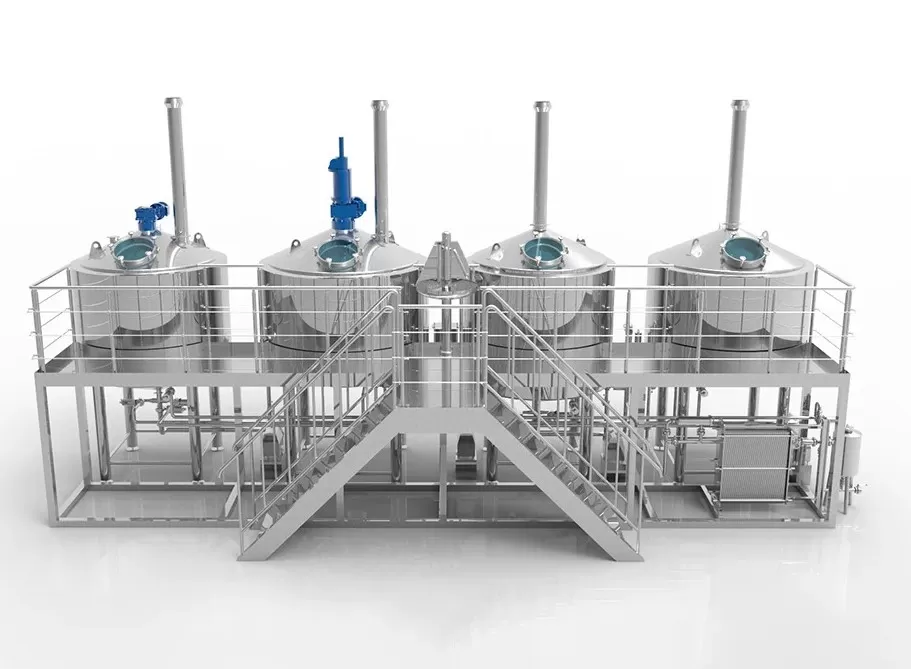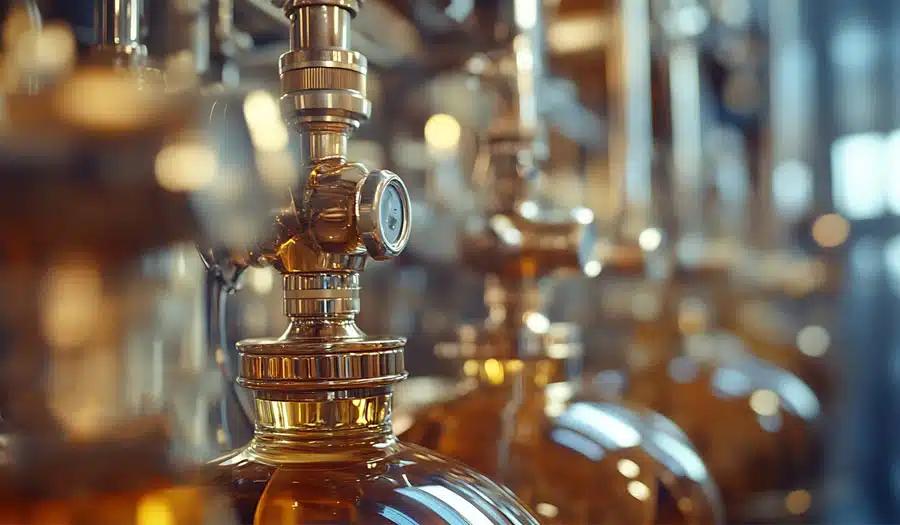O que é um destilador de álcool?
Um destilador de álcool é um utensílio que ajuda a preparar bebidas fortes. Pega na cerveja ou no vinho e transforma-os em coisas como o uísque ou a vodka. Isto acontece através do aquecimento e arrefecimento do líquido de uma forma especial.
As pessoas fabricam álcool desta forma há muitos anos. Os primeiros alambiques foram feitos há centenas de anos. Agora, temos melhores formas de o fazer.
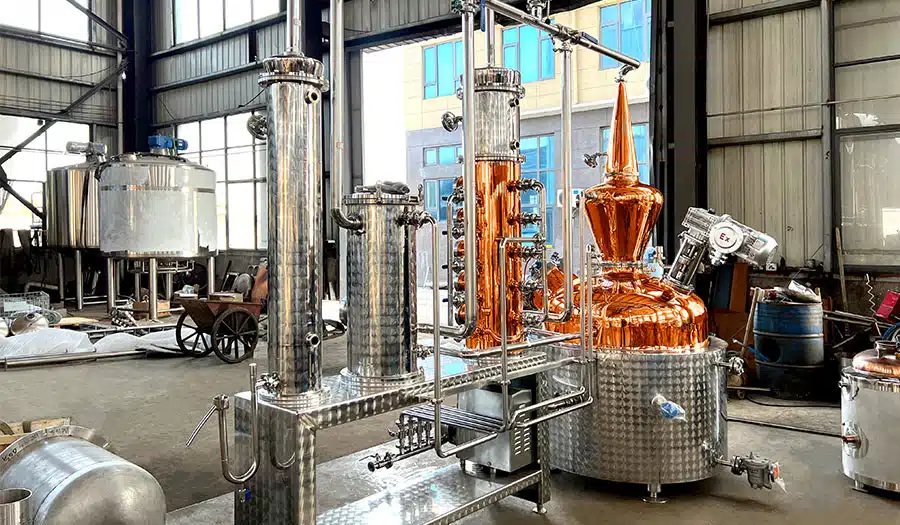
A ciência por detrás da destilação
Está cansado de tentar produzir bebidas espirituosas de alta qualidade com equipamento de fraca qualidade? Muitos destiladores caseiros e artesanais debatem-se com resultados inconsistentes, desperdiçando tempo e ingredientes preciosos. O seu trabalho árduo merece melhor.
Pense no que acontece quando a destilação corre mal. Lotes com sabor estranho. Dinheiro pelo cano abaixo. Clientes que não voltam. Esta frustração pode fazer com que queira desistir dos seus sonhos de destilação.
Felizmente, há uma maneira melhor. O equipamento de destilação moderno de líderes da indústria como Micetcom mais de 15 anos de experiência em tecnologia de fabrico de cerveja e destilação, pode transformar o seu processo. Os seus sistemas integrados asseguram um controlo perfeito da temperatura e resultados consistentes em todas as ocasiões, ajudando-o a criar bebidas espirituosas dignas de prémio desde o primeiro dia.
Como funciona a destilação
- Fermentação – Yeast eats sugar and makes alcohol
- Aquecimento – The alcohol gets hot and turns to vapor
- Condensação – Vapor cools and becomes liquid again
- Coleção – The strong alcohol is saved
Este processo funciona porque diferentes líquidos entram em ebulição a diferentes temperaturas. O álcool ferve a 78°C (173°F), mas a água ferve a 100°C (212°F).
Tipos de sistemas de destilação
Existem três tipos principais de alambiques:
- Pote ainda – The old way, used for whiskey and rum
- Coluna ainda – More modern, makes vodka and neutral spirits
- Refluxo ainda – Very clean spirits with less flavor
Cada tipo tem os seus pontos positivos. Os alambiques de pote mantêm mais sabor. Os alambiques de coluna produzem álcool mais puro. Os alambiques de refluxo produzem o álcool mais puro.
Empresas como Vendome Copper & Brass Works fazem alguns dos melhores alambiques. Mas muitos destiladores artesanais estão a descobrir que equipamento de destilaria dos fabricantes mais recentes oferece um melhor preço com a mesma qualidade.
Tipos de destiladores de álcool
Escolher o destilador certo para as suas necessidades
Sente-se perdido no mar de opções de destiladores? Com tantas opções, encontrar o equipamento certo para as suas necessidades específicas pode ser uma tarefa difícil. A escolha errada pode significar um investimento desperdiçado e resultados abaixo da média.
Considere a frustração de comprar um destilador que é demasiado pequeno para o seu negócio em crescimento ou demasiado complexo para o seu nível de competências. Estes erros podem custar milhares de euros e atrasar os seus sonhos de destilação.
E se tivesse um guia especializado? A equipa da Micet tem 15 anos de experiência na indústria para o ajudar a encontrar o sistema de destilação perfeito. As suas soluções personalizadas garantem que obtém exatamente o que precisa - quer esteja apenas a começar ou a aumentar a sua operação estabelecida.
Destiladores Caseiros vs. Destiladores Comerciais
| Caraterística | Destilador doméstico | Destilador comercial |
|---|---|---|
| Tamanho | Pequeno (1-5 galões) | Grande (50+ galões) |
| Preço | $500-$3,000 | $10,000-$100,000+ |
| Autorizações | Uso pessoal* | Autorizações TTB necessárias |
| Material | Frequentemente cobre | Aço inoxidável/cobre |
*Nota: A destilação caseira não é legal em muitos sítios. Verifique as leis locais.
Comparações de materiais
Alambiques de cobre:
- Ajuda a eliminar compostos de enxofre
- Dá um aspeto clássico
- Precisa de mais limpeza
- Mais custos
Aço inoxidável:
- Dura mais tempo
- Mais fácil de limpar
- Menos reativo
- Muitas vezes mais barato
Muitos destiladores artesanais consideram que um equipamento para destilarias comerciais A configuração com componentes em cobre e em aço inoxidável oferece o equilíbrio perfeito entre tradição e praticidade.
Resumo de produtos: Destiladores de topo
Estas são algumas das melhores opções:
- Alambique tradicional – Good for whiskey and rum
- Alambique híbrido moderno – Can make many types of spirits
- Automatizado Ainda – Easy to use with computer control
- Colunas contínuas – For high-volume vodka production
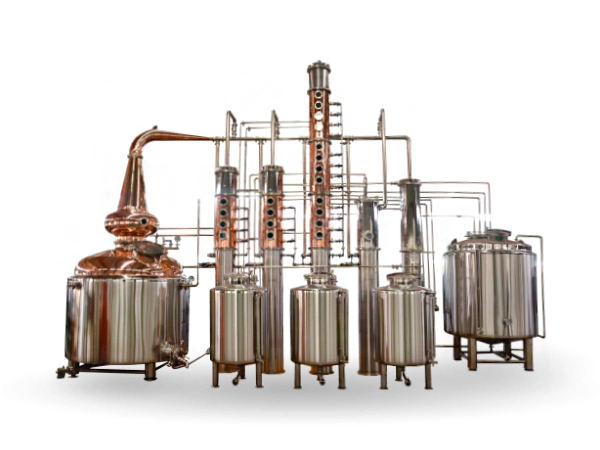
Factores a considerar na compra
Principais caraterísticas a avaliar
Está preocupado com a possibilidade de cometer um erro dispendioso ao comprar equipamento de destilação? Muitos compradores de primeira viagem concentram-se apenas no preço, esquecendo-se de factores críticos que afectam a qualidade e a segurança das suas bebidas espirituosas.
Imagine investir milhares em equipamento apenas para descobrir que é ineficiente, difícil de limpar ou pior - inseguro. Estes problemas podem encerrar a sua atividade antes mesmo de esta começar.
A solução é trabalhar com fabricantes experientes que compreendem tanto a arte como a ciência da destilação. A equipa de engenharia da Micet, com os seus 22 anos de experiência em conceção de processos, cria sistemas que optimizam tanto a qualidade como a segurança, enquanto a sua garantia de 3 anos para os depósitos proporciona tranquilidade para o seu investimento.
Ao analisar os destiladores, verifique os seguintes aspectos:
- Tamanho do lote – How much can you make at once?
- Métodos de aquecimento – Gas, electric, or steam
- Sistemas de controlo – Manual or computer
- Sistema de arrefecimento – Water usage and efficiency
- Facilidade de limpeza – Can you reach all parts?
- Caraterísticas de segurança – Pressure relief and fire prevention
O álcool por volume (ABV) O tipo de vodka que se quer produzir também é importante. Para a vodka, é necessário um alambique que possa atingir uma prova elevada. Para o uísque, o sabor é mais importante do que a prova elevada.
Orçamento vs. Qualidade
No caso dos destiladores, o que se paga é o que se recebe:
| Gama de preços | O que esperar |
|---|---|
| $500-$2,000 | Pequenas fotografias básicas para aprender |
| $5,000-$20,000 | Pequeno destilaria artesanal configuração |
| $50,000-$100,000 | Sistema profissional de pequenos lotes |
| $250,000+ | Sistema comercial completo |
Para os destiladores sérios, o retorno do investimento vem do equipamento de qualidade. O mercado mundial de bebidas espirituosas artesanais deverá atingir $80,3 mil milhões de euros até 2027O volume de negócios do sector da energia é de cerca de 1,5 mil milhões de euros, com um crescimento de 25,7% por ano. Isto faz com que um bom equipamento valha o seu custo.
Principais estatísticas
Segurança contra incêndios
Guia de configuração passo a passo
Como utilizar um destilador de álcool com segurança
Está nervoso com os riscos de segurança da destilação? Deveria estar. Configurações de destilação incorrectas podem levar a situações perigosas - desde incêndios a químicos nocivos no seu produto final.
Pense no que está em jogo: a sua segurança, as suas instalações e a saúde de todos os que experimentam as suas bebidas espirituosas. Sem o conhecimento adequado, está a fazer uma aposta que pode ter consequências graves.
É aqui que a orientação profissional faz toda a diferença. Com os 15 anos de experiência da Micet e centros de assistência dedicados em países como a França, Austrália e Canadá, tem acesso a conhecimentos especializados que garantem que o seu processo de destilação é seguro e está em conformidade. A sua equipa de profissionais qualificados pode ajudá-lo a implementar uma ventilação adequada, controlos de temperatura e protocolos de segurança - transformando um processo potencialmente perigoso numa operação segura e fiável.
Segurança em primeiro lugar
- Ter sempre um bom fluxo de ar – Alcohol vapors can catch fire
- Utilizar uma fonte de água – For cooling and in case of fire
- Nunca deixar uma máquina em funcionamento – Stay and watch it
- Manter as chamas afastadas – Use electric heat if possible
- Conheça os seus cortes – The first liquid (heads) can be toxic
Obter informações legais
O TTB (Alcohol and Tobacco Tax and Trade Bureau) controla a destilação nos EUA. É necessário obter licenças antes de começar. Isto leva tempo e dinheiro.
Uma autorização básica custa entre $1.000 e $5.000 por ano. Também se paga $13,50 por galão de prova em matéria fiscal.
Regulamentos locais de destilação variam muito. Alguns sítios não permitem a destilação de todo. Outros têm zonas especiais onde é permitido.
O Instituto Americano de Destilação e DISCUS (Distilled Spirits Council of the United States) tem boas informações para o ajudar a manter-se legal.
Considerações legais e de segurança
Navegar nas leis de destilação de álcool
Está confuso com a complexa rede de regulamentos de destilação? Muitos aspirantes a destiladores desistem antes de começar porque os requisitos legais parecem demasiado assustadores. Um passo em falso pode resultar em pesadas multas ou mesmo em acusações criminais.
Pense no stress de investir em equipamento apenas para descobrir que não o pode utilizar legalmente no seu local. Ou pior - enfrentar penalizações por não ter pago uma licença ou imposto crucial.
É aqui que a orientação especializada se torna inestimável. Os 15 anos de experiência da Micet no sector incluem a ajuda a mais de 1000 cervejeiras e destilarias a navegar pelos requisitos regulamentares em 86 países. A sua equipa compreende as nuances das licenças de álcool, impostos especiais de consumo e certificação de bebidas espirituosas artesanais - transformando um processo legal complicado num roteiro gerível para o seu sucesso na destilação.
Regras federais
O governo federal é rigoroso no que respeita à produção de álcool. As regras vêm de:
- TTB – Handles permits and taxes
- FDA – Makes sure it’s safe to drink
- EPA – Watches waste from making alcohol
Regras estatais e locais
Os Estados têm regras diferentes. Alguns tornam muito difícil a obtenção de uma licença. Outros querem ajudar os pequenos fabricantes.
As regras municipais também são importantes. É necessário verificar:
- Leis de zoneamento
- Códigos de incêndio
- Licenças de construção
- Regras relativas às águas residuais
Muitos destiladores trabalham com o destilador de álcool fornecedores que podem ajudar na conformidade legal como parte do seu pacote de serviços.
Manutenção e resolução de problemas
Prolongar a vida útil do seu destilador
Está preocupado com o tempo de vida útil do seu dispendioso equipamento de destilação? Muitos destiladores enfrentam falhas prematuras do equipamento devido a práticas de manutenção deficientes, o que leva a reparações dispendiosas e a paragens de produção.
A frustração de um alambique avariado durante o pico de produção pode ser devastadora. Não só perde tempo valioso de produção, como as reparações podem custar milhares e demorar semanas a concluir.
A resposta é a manutenção preventiva e o apoio com que pode contar. O abrangente apoio pós-venda da Micet, disponível através de 12 centros de assistência em todo o mundo, garante que nunca está sozinho quando surgem problemas. A sua garantia de 3 anos para os depósitos e de 1 ano para os auxiliares significa que pode destilar com confiança, sabendo que a ajuda especializada está apenas à distância de uma chamada quando precisar dela.
Conselhos de limpeza
Mantenha o seu alambique limpo para obter um melhor álcool e uma vida útil mais longa:
- Limpar após cada utilização – Don’t let residue dry
- Utilizar ácido cítrico – For copper stills to remove tarnish
- Verificar todos os vedantes – Replace if worn or damaged
- Inspecionar os condensadores – Clean out any mineral build-up
- Cobre polaco – Helps with remoção de congéneres
Problemas comuns e correcções
| Problema | Causa possível | Solução |
|---|---|---|
| Prova baixa | Condensador demasiado quente | Adicionar mais água de arrefecimento |
| Fora dos sabores | Contaminação por álcool | Melhor limpeza, substituição dos vedantes |
| Fugas | Acessórios soltos | Apertar ou substituir as juntas |
| Problemas de aquecimento | Falha do elemento | Verificar as ligações eléctricas |
Uma empresa de média dimensão destilaria artesanal pode esperar um retorno do investimento de cerca de 67% em três anos com uma manutenção adequada. Isto demonstra a importância de uma boa manutenção.
FAQs sobre destiladores de álcool
Perguntas comuns
Está hesitante em investir em equipamento de destilação porque existe muita informação contraditória? Muitos principiantes debatem-se com perguntas sem resposta que os impedem de dar o próximo passo na sua viagem de destilação.
A incerteza pode ser paralisante. Sem respostas claras de fontes fiáveis, como é que se pode avançar com confiança para o que pode ser um investimento significativo?
Deixe os especialistas de confiança esclarecerem a confusão. Com mais de 1000 instalações bem sucedidas de cervejarias e destilarias em 86 países, a equipa da Micet já se deparou com praticamente todos os cenários e questões. A sua equipa de serviços traz 22 anos de experiência em design de processos para abordar as suas preocupações específicas - transformando a incerteza em decisões confiantes.
"Posso destilar álcool legalmente em casa?"
Na maior parte dos EUA, a resposta é não. Produzir álcool para beber sem autorização é contra a lei federal. Alguns estados permitem pequenas quantidades para combustível, mas não para beber.
"Qual é a diferença entre a destilação de vodka e de uísque?"
Vodka necessita de álcool muito limpo. Utiliza alambiques de coluna para obter uma prova elevada (álcool 95%+).
Whisky mantém mais sabor. Utiliza alambiques e provas mais baixas (60-80% de álcool). Depois envelhece em barris de madeira.
"Quanto custa um destilador profissional?"
Uma pequena instalação profissional começa por volta de $50.000. Uma instalação completa destilaria artesanal com todo o equipamento pode custar entre $250.000 e $500.000.
"Que materiais são melhores para fotografias?"
O cobre é utilizado há séculos porque elimina os compostos de enxofre. O aço inoxidável dura mais tempo e é mais fácil de limpar. Muitos alambiques utilizam ambos os materiais.
"De quanto espaço preciso?"
Uma pequena destilaria artesanal precisa de pelo menos 1.000 pés quadrados. Isto inclui espaço para o alambique, fermentadores, armazenamento e engarrafamento.
Principais destiladores de álcool de 2025
Está a lutar para acompanhar a evolução dos gostos dos consumidores e a crescente concorrência no mercado das bebidas espirituosas? Muitos destiladores estão a ficar para trás porque o seu equipamento desatualizado não consegue oferecer a consistência ou a qualidade que os consumidores modernos exigem.
Dado que as bebidas espirituosas artesanais continuam a crescer a um ritmo de 25,7% por ano, os destiladores com equipamento inferior arriscam-se a perder quota de mercado e a fidelidade dos clientes a favor dos que possuem capacidades de produção mais sofisticadas.
A solução é estabelecer uma parceria com um fabricante de equipamento com visão de futuro que compreende tanto a tradição como a inovação. A equipa de I&D da Micet desenvolve continuamente novas soluções que combinam princípios de destilação consagrados pelo tempo com eficiência e controlo modernos. A sua abordagem personalizada garante que a sua destilaria pode produzir bebidas espirituosas únicas e de alta qualidade que o irão distinguir num mercado cada vez mais concorrido.
Tabela de comparação: Destiladores profissionais
| Tipo de modelo | Gama de preços | Capacidade | Melhor para | Caraterísticas principais |
|---|---|---|---|---|
| Sistema de alambique | $50K-$120K | 100-500L | Whisky, rum | Sabores tradicionais |
| Híbrido Ainda | $85K-$200K | 200-1000L | Multi-espírito | Versatilidade |
| Sistema de colunas | $150K-$300K+ | 500L+ | Vodka, gin | Elevada prova, eficiência |
| Chave na mão completa | $250K-$1M+ | Personalizado | Destilaria completa | Solução tudo-em-um |
A escolha certa depende das bebidas espirituosas que se pretende produzir e da quantidade.
Empresas como Destilaria Buffalo Trace e Destilaria Copper & Kings utilizam equipamento personalizado que se adapta às suas necessidades exactas. Muitos novos destiladores estão a descobrir que trabalhar com fabricantes experientes que compreendem o processo completo proporciona melhores resultados.
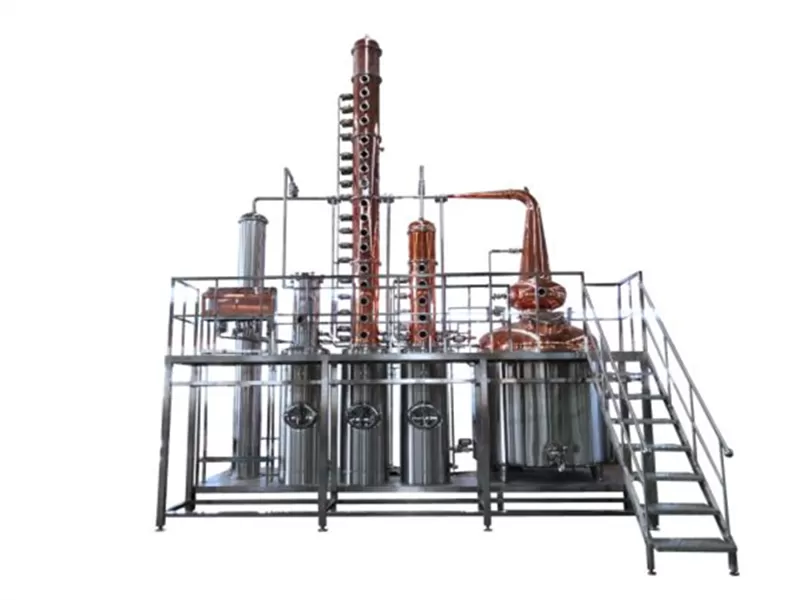
Impacto ambiental
Está preocupado com a pegada ambiental da sua destilaria? Muitos destiladores enfrentam um escrutínio crescente por parte dos consumidores e das entidades reguladoras relativamente à produção de resíduos e ao consumo de recursos.
A realidade é preocupante: as destilarias sem controlos ambientais adequados podem produzir 5-10% das suas matérias-primas como resíduos orgânicos, com uma utilização significativa de água e emissões que podem violar os regulamentos locais.
Eis como o design inovador do equipamento faz a diferença. A equipa de engenharia da Micet integra soluções sustentáveis nos seus sistemas de destilaria - desde a reciclagem de água à utilização eficiente de energia - reduzindo o impacto ambiental e os custos operacionais. Os seus sistemas atingem uma pontuação de impacto de toxicidade humana de apenas 0,85/kg (normalizado), inferior à média da indústria, ajudando-o a atingir os objectivos de sustentabilidade enquanto mantém a rentabilidade.
Pontuações de impacto ambiental
- Destilaria artesanal: 0,85/kg
- Grande fábrica de cerveja: 1,2/kg
- Adega: 0,6/kg
Gestão de resíduos
As boas destilarias planeiam o desperdício:
- Grão gasto – Can be animal feed
- Água de arrefecimento – Can be recycled
- Produtos químicos de limpeza – Must be properly disposed
Começar a trabalhar na sua destilaria
Primeiros passos para o sucesso
Sonha em abrir a sua própria destilaria, mas sente-se sobrecarregado com todos os pormenores? Muitos aspirantes a destiladores adiam os seus planos durante anos por não saberem por onde começar ou como coordenar todos os elementos necessários.
A complexidade pode ser paralisante - desde a seleção do equipamento à conceção das instalações, da conformidade regulamentar ao planeamento da produção. Um passo em falso pode custar milhares em recursos desperdiçados ou atrasos.
E se tivesse um parceiro para o orientar ao longo de todo o processo? A abordagem de soluções chave-na-mão da Micet ajudou a estabelecer mais de 1000 cervejarias e destilarias de sucesso em 86 países. A sua equipa, liderada pela CEO Nancy, com 15 anos de experiência internacional, oferece um apoio abrangente desde o conceito inicial até à instalação do equipamento e mais além - transformando o sonho da sua destilaria numa realidade rentável.
Planear a sua destilaria
- Elaborar um plano de actividades – Know your costs and sales goals
- Escolha os seus espíritos – What will you make?
- Encontrar um local – Check zoning laws
- Pedir licenças – Start early, this takes time
- Conceber o seu espaço – Work with experts who know distilling



